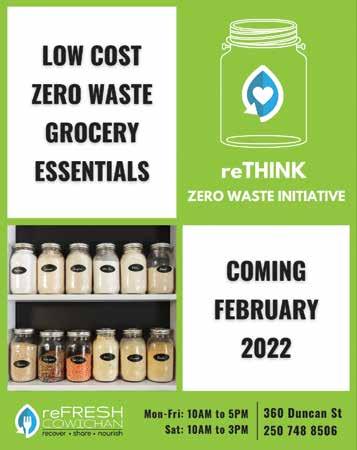
3 minute read
Duncan’s First Free Food Pantry
As the rain pours during frosty mornings, Lauren (my supervisor) and I survey the misty scene at Kin Park, with the vapour of our breath billowing like smoke from our lips. Every morning we conduct a sweep and hope for the best. With any urban space close to downtown, the park can be a hotspot for theft, vandalism, littering, and the remnants of fires. The latter piece of evidence has been common for many months now and gives us pangs of worry for when the rains disappear. As we sift through the ashes, ensuring there are no smouldering embers, we often find peculiar treasures. Potatoes wrapped in foil, empty cans of beans, other scraps of makeshift cooking material. Fire is a tool for sustenance as much as it is for warmth. The fires have been a source of contemplation for us. When we realized folks were cooking food from the gardens (or elsewhere), we had to swallow the difficult reality of how frequently food insecurity shows its undying face. The fires and the theft are only a by-product of the real problem. The ones who light fires to cook their only meal of the day are the ones who hold the brunt of the real problem.
We hear the words “food justice” and “food security” so often these days, it can be hard to pin down the meaning. They are tied in with public health, socioeconomic status, agriculture, cost of living, community and so much more. They do not exist in a bubble. It is entrenched within a larger system - a system where the harmful consequences of disjuncture and poor access can be seen in front of us every day. Mutual aid is also designed to promote egalitarianism, which opposes hierarchies between participants, and between organizers and the communities that projects serve. The thing about systemic problems is that they require solutions cut from the same cloth. This was a glaring realization for us at Kin Park in these past months. We were witnessing the ripple effect of a systemic problem play out in front of our eyes. So, instead of viewing those who are affected as the problem, we opted to find a solution to help all of us. With the support of Vancouver Island University and Victoria Foundation, the Community Food Pantry is born!
Advertisement

For most, a huge factor in feeling “at home” is having access to food within the community you live in. Being able to do that in a dignified way is important, and this is the difference between a community pantry and a food bank. This project is not a charity program, it is mutual aid. Mutual aid means that we act with kindness to help each other as one community. Like when a neighbour bakes you bread after you decided to shovel their walkway. Or when you take turns driving your kids to school and soccer practice. We want to foster the “at home” feeling around the pantry, the park and our city, and we need your solidarity to do so.
As this pantry is built, with the helping hands of Vancouver Island University students and Victoria Foundation’s Neighbourhood Small Grants, we are looking ahead to ensure the success of this project. If you would like to be involved with the building, painting, stocking, cleaning or maintenance of the pantry, please contact blare@ cowichangreencommunity. org. Your support is needed and appreciated by all. Join us, neighbours!
Blare Conlin (she/ her) Urban Farm Intern Kin Park Youth Urban Farm Cowichan Green Community









